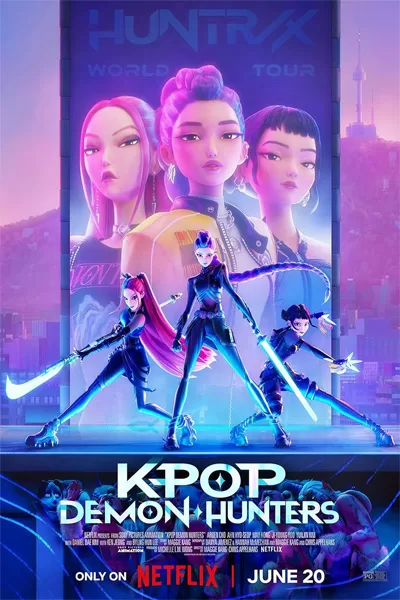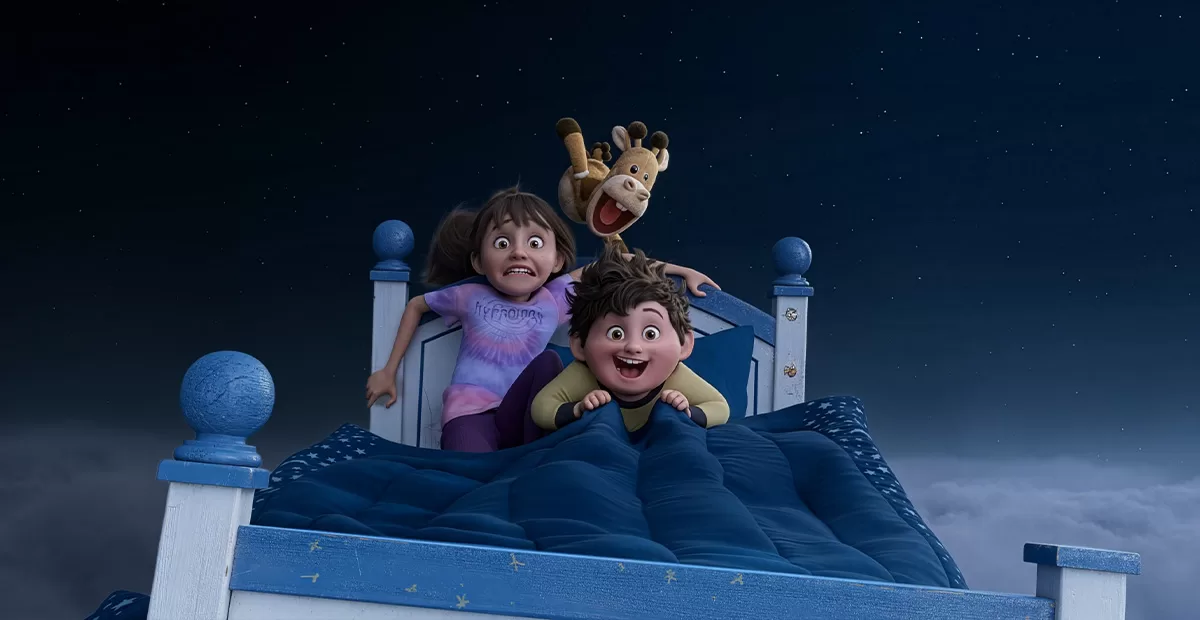
- Starring
- Arden Cho, May Hong, Ji-young Yoo
- Directors
- Chris Appelhans, Maggie Kang
- Rating
- PG
- Genre
- Action, Adventure, Comedy, Family
- Release date
- June 20, 2025
- Where to watch
- Netflix
Overall Score
Rating Overview
Rating Summary
In a demon-ravaged Seoul, a K-pop girl group secretly doubles as demon hunters, using their music to fuel a magical barrier against soul-eating fiends. When a rival boy band with dark secrets emerges, the girls face a high-stakes showdown at a major music event to save the city, all while one member hides a dangerous truth about her past.
KPop Demon Hunter Micro-Review
Our summary pretty much says it all.
KPop Demon Hunters is a half-baked stringing together of animated music videos with a thin and overly dramatic plot in the hopes of tantalizing tween girls and the Vikings’ newest cheerleader into downloading the soundtrack.
PARENTAL NOTES
PG Appropriate
- For the most part, the violence and intensity line up with a PG rating. However, it’s important to remember that the show is about three girls who slay demonic-looking demons as the demons murder people and collect their souls for an entity that is ostensibly, if not explicitly, Satan.
- We don’t ever see the exact moments that demons kill folks, but we do see floating lights that are supposed to be the souls of murdered people being consumed by a being, Gwi-ma, the ruler of the demon realm.
- He’s a big purple and pink fire, so the consumption is more of an absorption. There’s nothing graphic.
- Early in, a demon tells the demon hunters, “Now you gotta die,” cementing that the show is serious about killing people.
- We don’t ever see the exact moments that demons kill folks, but we do see floating lights that are supposed to be the souls of murdered people being consumed by a being, Gwi-ma, the ruler of the demon realm.
I’m Too Sexy For My Shirt
- When the boy band is first introduced, the girls female-gaze them like starving dogs staring down a butcher shop.
- While the girls drool, one of the men in particular is overly sexualized. First, we see his rippling muscles through his tight shirt. Then, as the boys continue to walk together in slow motion, his muscles ripple and bulge, causing his shirt to slowly burst open, first revealing his abs and then bursting all of its buttons to fully display his torso.
- He is wearing low-rise jeans that start just above his pubic region.
- Everything from the music to the cinematography is specifically designed to promote lustfulness.
- While the girls drool, one of the men in particular is overly sexualized. First, we see his rippling muscles through his tight shirt. Then, as the boys continue to walk together in slow motion, his muscles ripple and bulge, causing his shirt to slowly burst open, first revealing his abs and then bursting all of its buttons to fully display his torso.
- I didn’t mark the Age Appropriate bar down much for this because it’s a very brief moment in the film and not repeated. However, I wouldn’t let my daughters watch KPop Demon Hunters because of this, if nothing else.
WOKE REPORT
Three Amigas
- KPop Demon Hunters gives us, not one, not two, but three nearly flawless and unstoppable super-girls.
- The main character’s story arc is about her starting out awesome, coming out of the closet as a half-demon, and fully accepting her awesomeness, which makes her even more awesome. Zzzzzzzzzzz.
- It’s not sanctimonious about girl-bossness, femininity, etc.
- You might wonder why I’m not marking down the Woke-O-Meter more with what could easily be considered some queer-coded themes. However, as stated in the Age Appropriate section, the girls are clearly boy-crazy, and there is no other indication that this is a metaphor. So, I’m giving this Korean creation the benefit of the doubt.
- The main character’s story arc is about her starting out awesome, coming out of the closet as a half-demon, and fully accepting her awesomeness, which makes her even more awesome. Zzzzzzzzzzz.
It Takes a German Village
- There are three instances of the same group of three very gay-seeming young men behaving like overly emotional fans, loudly crying while hugging one another when they see their favorite girl band.
- To be clear, nothing explicitly marks them as homosexual, but one wears a scarf that (at least in America) would be something only a gay man would wear, and their general demeanor strongly suggests it.
James Carrick
James Carrick is a passionate film enthusiast with a degree in theater and philosophy. James approaches dramatic criticism from a philosophic foundation grounded in aesthetics and ethics, offering insight and analysis that reveals layers of cinematic narrative with a touch of irreverence and a dash of snark.






3 comments
fisch050
August 27, 2025 at 9:41 pm
My 18yo daughter loves this movie. She watched it for her 6th time with me. There are a few other wokish elements. For instance, the guy gets saved by the girl (woke), but he does so by sacrificing himself for her (based), so wokish.
My biggest problem with the movie is it’s horrible theology. It’s hard to pin down, in the gauzy, ephemeral New Age way, but it is absolutely terrible theology. I hope that my daughter doesn’t internalize any of it.
nicoleboyers1
November 3, 2025 at 12:49 pm
I’m just happy to hear the girls are boy crazy and not lusting after demons or each other.
Sweet Deals
November 5, 2025 at 1:13 am
I wouldn’t seek this movie out myself, but I heard too many positive reviews from other people and saw too many little girls wearing Halloween costumes from this movie, so I figured I should look into it and form a second opinion. Before I begin, I’d like to say that the Mary Sue mentality, while very annoying, is not an inherently woke thing. It’s just the way a tween girl’s brain is naturally wired. And while tween girls are obsessed with beauty to some degree, I will admit that this part of a girl’s life is not pretty. Every girl has to navigate this perilous phase before she can successfully come of age.
Because I’m not a tween girl myself, many of the tween girl dopamine hits in this movie were things that I honestly found obnoxious and difficult to process. Yes, the movie is hyper and overstimulating, and if you’re not a fan of KPop celebrity worship, social media addiction and all the other various pop cultural excesses that modern-day Korea has to offer, then you’re likely going to be as nauseated about it as I am. I struggled getting through this movie just as much as I struggled forcing myself through Pixar’s Turning Red for most of the same reasons, except this time in Korean instead of Chinese-Canadian. Oh, and if the cartoonish and overwrought boy-crazy drooling that the Demon Hunters do qualifies as being grossly inappropriate, I would also ding the movie for graphic mukbang as well. (If you don’t know what mukbang is, don’t bother looking it up). But while I power through all that nonsense, let’s see if I can get to the heart of the matter.
The three Demon Hunters who make up the KPop band Huntrix, are, on the surface, perfect and amazing. They’re pretty, talented, famous, wealthy, glamorous, and they live in the lap of luxury. They sing songs that make people happy in order to form a magical shield that prevents demons from entering their world and feeding off souls, so they’re also secretly superheroes, too. Their legions of fans worship them as idols. However, their perfection is really an illusion. Zoey is admired for her creativity, but deep down she thinks she’s freak who tries too hard to please everyone and doesn’t please anyone. Mira is admired for being the “black sheep” of her family, but underneath her cool, bored and hardened exterior, she actually feels very alone and doubts whether she’s even worthy of friendship. And, our heroine, Rumi, was born from a Demon Hunter mother and a Demon father. Her demon half makes her super-strong, but since she’s been taught all her life that demons are evil, she’s afraid that being born half-demon means she will transform into an evil creature who hurts people and she won’t be able to stop herself. The three girls are repeatedly told that they must hide their faults and fears and constantly project an image of confident perfection at all times in order to maintain the illusion of happiness for their adoring fans. They plan to seal away the demons from the world forever by releasing a hit single called “Golden”, which is essentially an anthem saying that the very things that each make each of the girls feel the most anxious and ashamed of are actually their greatest strengths and what makes them better than all the other mere mortals. Naturally, it’s a song celebrating self-centered arrogance disguised as confidence; the worst of the Mary Sue mentality, and the sooner they release it and get to the top of the charts, the sooner the demons will be sealed and they won’t have to live in fear of them. But of course things aren’t that simple, and complications arise.
Midway through the movie, as Rumi’s secret fears and doubts make it harder for her to do her job as both a singer and a hunter, Huntrix is challenged by a rival boy band made up of demons disguised as Korean pretty boys who threaten to weaken the girls’ positive influence by luring their fans away. Zoey and Mira come up with the idea to shelve “Golden” and release a different single called “Takedown”, a cruel song that will expose their rivals as demons. However, this tactic backfires when the demons trick Zoey and Mira into singing the song to Rumi, exposing her as a demon and therefore the very thing she and her friends hate, destroying both her confidence and their friendship. Rumi can no longer hide what she is or lie about it anymore, and she’s so ashamed that she believes she really is the kind of selfish monster she fears she is.
With Huntrix broken up, the shield that keeps the demons out fades, fear and self-doubt runs rampant, and everyone falls for their hypnotizing soul-devouring spell. In order to defeat the demons, Rumi has to sing a new song based on the experiences that she’s grown from. The moral, which the movie nailed, is that you can’t defeat your fears and self-doubt through arrogance and a false sense of perfection, and you can’t defeat it through hatred of your enemies, either. Rumi learns that the way to heal her troubles and doubts is to let go of her need to be perfect all the time. Instead of letting fear and shame paralyze her, she not only learns accept her shortcomings and forgive herself, but to extend that forgiveness to others; to move past their faults and encourage them to be their best selves. It’s about learning how to find grace and bring out the goodness in others.
A closing word I’d like to add: modern teen fantasies like this one often suggest that what we think is evil is actually just misunderstood. In the mind of an idealistic and insecure teen, it’s comforting to think that, but that runs the risk of forgetting that genuine evil does exist in this world. It takes a certain degree of wisdom to know the difference between honest mistakes meant to be forgiven with grace and true evil which should rightfully be condemned. It can be tricky. Rumi’s enemy gradually tried to convince her that he wasn’t evil and that he regretted his selfish actions, but then betrayed her and claimed it was all just a lie to gain her trust. But it wasn’t all for naught because her grace did cause him to genuinely regret his actions and repent in the end. Be sure that your daughters learn to discern the difference between good and evil lest they be manipulated into misdirecting their grace and compassion toward defending the wrong things.